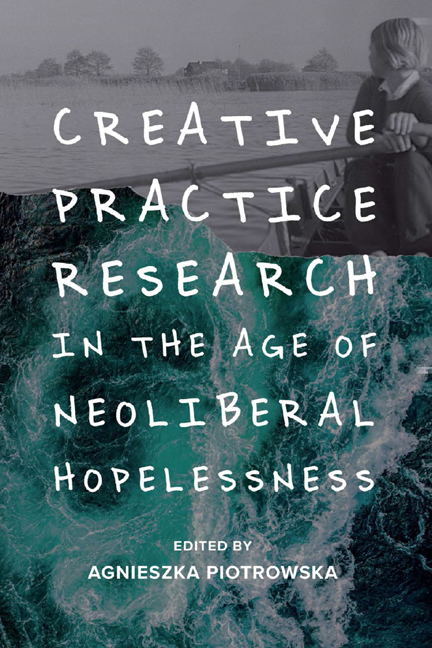Book contents
- Frontmatter
- Contents
- List of Figures
- Notes on Contributors
- Acknowledgements
- Preface: Life in the Post Pandemic Age
- Dedication
- 1 Introduction: Complexities, Compromises and Complicities
- 2 Against the Grain: Women Film Practitioners and Theorists Talk Creative Practice and Theory
- 3 Married to the Eiffel Tower: Notes on Love, Loss and Knowledge
- 4 Creativity and Neoliberalism: Between Autonomy, Resistance and Tactical Compliance
- 5 Tactical Compliance and the Persistence of Elsaesser
- 6 Storytelling and Game Playing
- 7 Autonomy and the Other Woman: Queer Active Agency and Postcolonial Expectations
- 8 From Neolithic to Neoliberal
- 9 First-person Expression on ‘Non-Western’ Screens: China as a Case Study
- 10 Scholarly Exploration of the Creative Process: Integrating Film Theory and Practice
- 11 Teaching Practice as Theory: Guerrilla Filmmaking
- 12 Baits of Falsehood: The Role of Fiction in Documentary or From Untheorised Practice to Unpractised Theory
- 13 Repented: A Creative Intersemiotic Translation
- Notes on Repented
- 14 How do you see me? The Camera as Transitional Object in Diasporic, Domestic Ethnography
- 15 ‘Shut Your Hole, Girlie. Mine's Making Money, Doll’: Creative Practice-Research and the Problem of Professionalism
- 16 Feminist ‘Pensive-creative Praxis’ and Irigaray: A Porous, Dialogical Encounter
- 17 The Paths of Creation, or How Can I Help my Dybbouk to Get Out of Me?
- 18 ‘We Want to Kill Boko Haram’: Reflections on the Photographic Representation of Children in a Displacement Camp
- 19 Between ‘Counter-movement’ (Ingold) and ‘Living with Ghosts’ (Demos)
- 20 Screen Memories: A Video Essay on Smultronstället/Wild Strawberries
- Index
11 - Teaching Practice as Theory: Guerrilla Filmmaking
Published online by Cambridge University Press: 17 October 2020
- Frontmatter
- Contents
- List of Figures
- Notes on Contributors
- Acknowledgements
- Preface: Life in the Post Pandemic Age
- Dedication
- 1 Introduction: Complexities, Compromises and Complicities
- 2 Against the Grain: Women Film Practitioners and Theorists Talk Creative Practice and Theory
- 3 Married to the Eiffel Tower: Notes on Love, Loss and Knowledge
- 4 Creativity and Neoliberalism: Between Autonomy, Resistance and Tactical Compliance
- 5 Tactical Compliance and the Persistence of Elsaesser
- 6 Storytelling and Game Playing
- 7 Autonomy and the Other Woman: Queer Active Agency and Postcolonial Expectations
- 8 From Neolithic to Neoliberal
- 9 First-person Expression on ‘Non-Western’ Screens: China as a Case Study
- 10 Scholarly Exploration of the Creative Process: Integrating Film Theory and Practice
- 11 Teaching Practice as Theory: Guerrilla Filmmaking
- 12 Baits of Falsehood: The Role of Fiction in Documentary or From Untheorised Practice to Unpractised Theory
- 13 Repented: A Creative Intersemiotic Translation
- Notes on Repented
- 14 How do you see me? The Camera as Transitional Object in Diasporic, Domestic Ethnography
- 15 ‘Shut Your Hole, Girlie. Mine's Making Money, Doll’: Creative Practice-Research and the Problem of Professionalism
- 16 Feminist ‘Pensive-creative Praxis’ and Irigaray: A Porous, Dialogical Encounter
- 17 The Paths of Creation, or How Can I Help my Dybbouk to Get Out of Me?
- 18 ‘We Want to Kill Boko Haram’: Reflections on the Photographic Representation of Children in a Displacement Camp
- 19 Between ‘Counter-movement’ (Ingold) and ‘Living with Ghosts’ (Demos)
- 20 Screen Memories: A Video Essay on Smultronstället/Wild Strawberries
- Index
Summary
In this essay, I shall describe the content and the delivery of a module (referred to in some institutions as a course or a unit) that I designed at my institution, called Guerrilla Filmmaking. The reasons for doing this are several. Since the module springs in some senses from my own theoretical research into and practice as a zero-budget filmmaker, Guerrilla Filmmaking exemplifies how to bridge practice and theory in the classroom, or, to put it in the language of this edited collection, how to teach practice-research. As the making of zero-budget films springs from the development of readily available digital technologies, the module also allows students themselves to bridge practice as research, in that the module involves the adoption of new media technologies in order to explore their expressive possibilities, which also means that practice (for example, making films with smartphones) involves research (working out what sorts of film a smartphone can help to produce), which in turn helps to generate a theoretical understanding of what (in this example) smartphones mean. As we shall see, by exploring the expressive possibilities of new media technologies, students (and teachers) on the module begin to understand that they are not ‘inferior’ to conventional cinematic technologies, but simply different – a shift in outlook/theoretical thinking that the module conscientiously ties to a history of ‘imperfect’ cinema (both as a theory and as a practice), which shift itself is linked to a ‘decolonisation’ or a ‘liberation’ of thought in relation to film and perhaps to the world more generally. In order to understand how Guerrilla Filmmaking does this, though, let us begin with an overview of the module.
THE PRAGMATICS OF GUERRILLA FILMMAKING
Guerrilla Filmmaking is a module in which, over the course of an eleven- or twelve-week semester, students are invited to make a portfolio of three to five short films (typically I ask them to have a duration of between one and three minutes, although some can be slightly shorter and some longer). The three highest scoring of these films are carried forward as the first of two assignments that students complete for the module. Each of the films involves a formal and a thematic ‘constraint’, in that students must make a film on a certain topic, or which answers a certain question (about which more below), while at the same time only using certain filmmaking techniques.
- Type
- Chapter
- Information
- Creative Practice Research in the Age of Neoliberal Hopelessness , pp. 150 - 163Publisher: Edinburgh University PressPrint publication year: 2020



